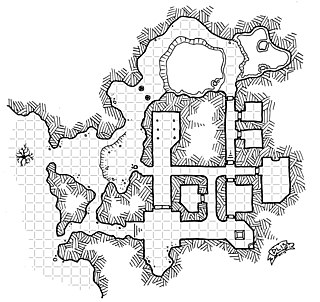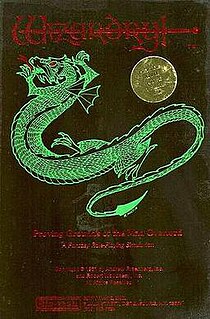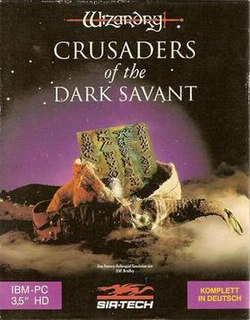
Wizardry is a series of role-playing video games, developed by Sir-Tech, that were highly influential in the evolution of modern role-playing video games. The original Wizardry was a significant influence on early console role-playing games such as Final Fantasy and Dragon Quest. Originally made for the Apple II, the games were later ported to other platforms. The last game in the original series by Sir-Tech was Wizardry 8, released in 2001. There have since been various spin-off titles developed for the Japanese market.

A role-playing video game is a video game genre where the player controls the actions of a character immersed in some well-defined world, usually involving some form of character development by way of recording statistics. Many role-playing video games have origins in tabletop role-playing games and use much of the same terminology, settings and game mechanics. Other major similarities with pen-and-paper games include developed story-telling and narrative elements, player character development, complexity, as well as replay value and immersion. The electronic medium removes the necessity for a gamemaster and increases combat resolution speed. RPGs have evolved from simple text-based console-window games into visually rich 3D experiences.

Wizardry II: The Knight of Diamonds is the second game in the Wizardry series of role-playing video games. It was published in 1982 by Sir-Tech.

Sir-Tech Software, Inc. was a video game developer and publisher based in the United States and Canada.

A dungeon crawl is a type of scenario in fantasy role-playing games in which heroes navigate a labyrinth environment, battling various monsters, avoiding traps, solving puzzles, and looting any treasure they may find. Video games and board games which predominantly feature dungeon crawl elements are considered to be a genre.
Robert J. Woodhead is an entrepreneur, software engineer and former game programmer. He claims that a common thread in his career is "doing weird things with computers".
Andrew Greenberg is a game designer of tabletop role-playing games and role-playing video games.
David W. Bradley is a video game designer and programmer, most notable for the role-playing video games Wizardry V, VI, and VII.

Wizardry: Proving Grounds of the Mad Overlord is the first game in the Wizardry series of role-playing video games. It was developed by Andrew Greenberg and Robert Woodhead. In 1980, Norman Sirotek formed Sir-Tech Software, Inc. and launched a beta version of the product at the 1980 Boston Computer Convention. The final version of the game was released in 1981.

Akitoshi Kawazu is a Japanese game designer, director, producer and writer. After joining Square in 1985, he went on to become a central developer for the first two Final Fantasy titles, then acted as creator and lead developer for the SaGa series.

Wizardry 8 is the eighth and final title in the Wizardry series of role-playing video games by Sir-Tech Canada. It is the third in the Dark Savant trilogy, which includes Wizardry VI: Bane of the Cosmic Forge and Wizardry VII: Crusaders of the Dark Savant. It was published in 2001 by Sir-Tech, and re-released by Night Dive Studios on GOG.com and Steam in 2013.

Wizardry VII: Crusaders of the Dark Savant is the seventh title in the Wizardry series of role-playing video games by Sir-Tech Software, Inc., preceding Wizardry 8 and succeeding Wizardry VI: Bane of the Cosmic Forge. It is also the second entry in the 'Dark Savant' trilogy. The game was published in 1992 by Sir-Tech, originally developed for DOS. In 1996 it was remade into Wizardry Gold, designed to work on Windows and Macintosh, and distributed by Interplay.
Star Saga is a series of video games which combine a computerized game arbiter with hefty sections of printed text. The games blend aspects of paper gamebooks with role-playing video games. They were released for MS-DOS and the Apple II.
Daniel Greenberg is a video game and role-playing game designer and author. He has worked with publishing companies such as Palladium Books, Mayfair Games, Pulsar Games, and Last Unicorn Games, but probably most extensively with White Wolf on supplements to the Vampire: The Masquerade and other storyteller games. He has also written scripts for numerous video games, including: X-Men: The Mutant Wars, Vampire: The Masquerade - Redemption, Tenchu 2: Birth Of The Stealth Assassins, Star Control 3, Star Trek: Starfleet Academy, and many others, including educational titles for The Walt Disney Company.

Yuji Horii is a Japanese video game designer and scenario writer best known as the creator of the Dragon Quest series of role-playing games, supervising and writing the scenario for Chrono Trigger, as well as one of the first visual novel adventure games Portopia Serial Murder Case.

Star Saga One: Beyond the Boundary is the first game in the Star Saga series.
Western role-playing video games are role-playing video games developed in the Western world, including The Americas and Europe. They originated on mainframe university computer systems in the 1970s, were later popularized by titles such as Ultima and Wizardry in the early- to mid-1980s, and continue to be produced for modern home computer and video game console systems. The genre's "Golden Age" occurred in the mid- to late-1980s, and its popularity suffered a downturn in the mid-1990s as developers struggled to keep up with changing fashion, hardware evolution and increasing development costs. A later series of isometric role-playing games, published by Interplay Productions and Blizzard Entertainment, was developed over a longer time period and set new standards of production quality.

Nemesis: The Wizardry Adventure is a 1996 adventure and role-playing video game developed and published by Sir-Tech. It is a spin-off of the Wizardry series of games. Ports for Sega Saturn and Microsoft Windows were released in Japan in 1998.

Grimoire: Heralds of the Winged Exemplar is a dungeon-crawling role-playing video game developed by Australian studio Golden Era Games. The game was released for Windows on August 4, 2017, and features turn-based combat and blobber gameplay, with a fantasy style with influences from other genres.
Mario & Luigi is a series of role-playing video games developed by AlphaDream and published by Nintendo for the latter's various video game handheld consoles. The series is a spin-off from Nintendo's trademark Super Mario series, and stars the titular characters Mario and Luigi. The story follows the two on a quest to defeat the antagonist, primarily Bowser. It began in 2003 on the Game Boy Advance with Mario & Luigi: Superstar Saga, the last title being Mario & Luigi: Paper Jam in 2015 for the Nintendo 3DS. Two other titles in the series, including Superstar Saga, had an additional remake for the Nintendo 3DS, with Mario & Luigi: Bowser's Inside Story + Bowser Jr.'s Journey being the last game in the series before AlphaDream declared bankruptcy in 2019.












